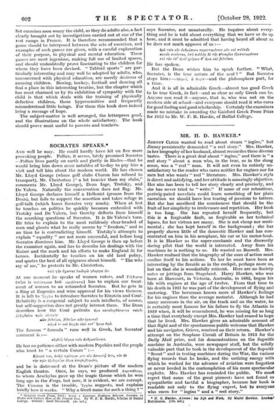MR. H. D. HAWKER.* JOHNNY CLEGG wanted to read about
steam " ingins," but Jinney persistently demanded " a reel story." Mrs. Hawker, in her biography of her husband, almost reconciles these diverse tastes. There is a great deal about " ingins," and there is " a reel story " about a man who, in the true, as in the slang sense, was a " reel " man. It will not even be entirely un- satisfactory to the reader who cares neitlier for engines nor for men but who wants " reel " literature. Mrs. Hawker's style is direct and satisfying, and her attitude is amazingly objective. Her aim has been to tell her story clearly and precisely, and she has never tried to " write." If some of our robustious, periwig-pated novelists could learn something of her plain narration we should have less tearing of passions to tatters. But she has sacrificed the conciseness that should be the fruit of her simplicity to irrelevance and repetition. Her book is too long. She has repeated herself frequently, but this is a forgivable fault, as forgivable as her technical lapses, for her virtues are many. She is not cheap nor senti- mental ; she has kept herself in the background ; she has properly shown little of the domestic Hawker and has con- centrated on him in his aeroplane, his car or his motor-boat. It is in Hawker as the super-mechanic and the discreetly daring pilot that the world is interested. Away from his machines he is nothing to us. He wanted no Boswell. Mrs. Hawker realized that the biography of the man of action must confine itself to his actions. To her he must have been as interesting by the fireside as in the cockpit, perhaps more so, but on that she is wonderfully reticent. Here are no Society notes or jottings from Stageland. Harry Hawker, who was born at Harcourt, in Victoria, Australia, in 1862, began his life with engines at the age of twelve. From that time to his death in 1921 he was part of the development of flying and motoring. The horseman knows more of Hawker's feelings for his engines than the average motorist. Although he had many successes in the air, on the track and on the water, he is certainly most famous for his failure to fly the Atlantic in 1919 when, it will be remembered, he was missing for so long a time that everybody except Mrs. Hawker had ceased to hope that he lived. Mrs. Hawker gives an admirable account of that flight and of the spontaneous public welcome that Hawker and his navigator, Grieve, received on their return. Hawker's attempt on the Seaplane Circuit of Britain in 1913 for the Daily Mail prize, and his demonstrations on the Sopwith machine in Australia, were newspaper stuff, but the solidly valuable part that he took in the development of the Sopwith " Scout " and in testing machines during the War, the various flying records that he broke, and the untiring energy with which he worked for the advance of aviation were forgotten or never heeded in the contemplation of his more spectacular exploits. Mrs. Hawker has reminded the public. We must regret that some of the great pioneers have not found so sympathetic and tactful a biographer, because her book is readable not only to the flying expert, but to everyone who cares for " ingins " and a " reel story."
• H. G. Hawker, dovias: his Lilo and Work, By Muriel Hawker. Lond0a; Hutchinson. [18i. net.]










































 Previous page
Previous page